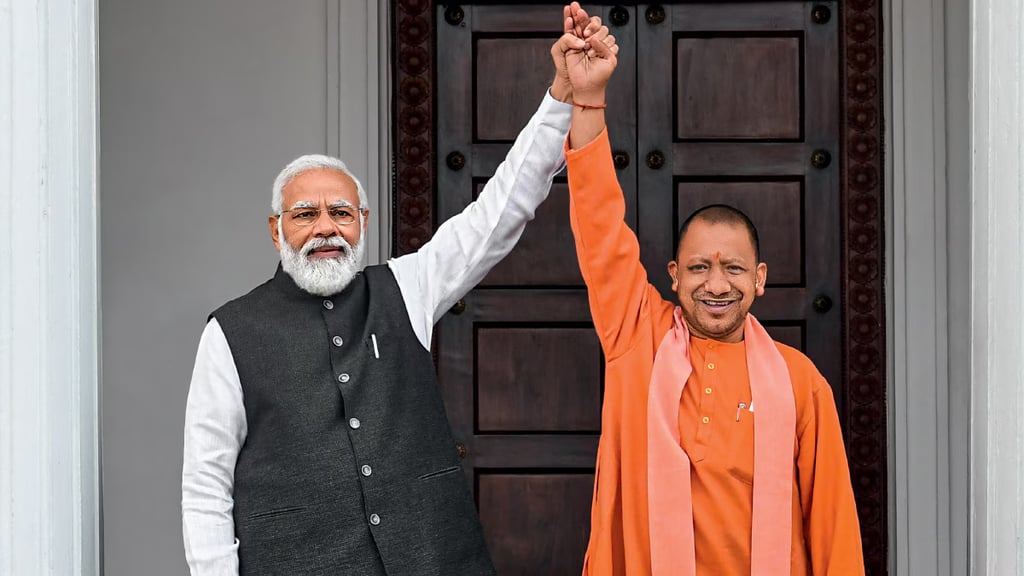Is Yogi Essential in 2027 for Modi to Repeat 2019 in 2029?
UP is central in Indian politics, sending 80 MPs. In 2019, BJP won big by combining Modi’s national appeal with Yogi’s strong state leadership.
INSIGHTS
Gaurav Upadhyay
11/7/20254 min read


Few political partnerships in contemporary India have drawn as much public curiosity as that between PM Narendra Modi and UP CM Yogi Adityanath. Both are strong personalities, both command a distinct following, and both have come to symbolize different strands of the BJP’s evolving political identity. As the nation edges closer to the 2027 Uttar Pradesh State Legislative Assembly Elections and the 2029 Lok Sabha polls, one question quietly dominates conversations in political circles that does PM Narendra Modi’s 2029 dream run through Yogi’s 2027?
Undoubtedly, Uttar Pradesh is the heart of Indian politics. It sends 80 members to the Lok Sabha, and any national party that wins India must first win UP convincingly. In 2019, the BJP captured 62 of these seats under Modi’s national leadership and Yogi’s state machinery. The combination worked because it blended two energies . Modi’s national narrative of governance and development, and Yogi’s image of discipline, law, and decisive administration in UP worked tremendously for them.
But as they say , politics is not mathematics and here 1 plus is not always 2. Here, equations shift with time, expectations rise, and fatigue often sets in. Since 2017, Yogi has emerged not only as a chief minister but also as a national figure with his own political grammar. His governance model having strict law enforcement, focus on infrastructure, and clear welfare delivery; has earned both admirers and critics. Yet, among supporters, his image as a “no-nonsense administrator” who speaks less and delivers more has remained steady.
To understand why Yogi’s return in 2027 matters to Modi’s 2029 prospects, one must see UP as more than a state as it is the testing ground of national mood. Every election here is a semi-final of sorts. The BJP’s organizational strength in UP provides the psychological and electoral momentum that carries into national polls.
Yogi’s governance style has institutionalized several things that help the BJP electorally. First, the perception of improved law and order which is a critical issue that had haunted previous governments. Second, the vast network of welfare schemes of the centre and state both ,reaching deep into villages in domains such as housing, ration distribution, and rural employment support. And third, a narrative of self-reliance and pride, especially among youth, who see Yogi’s leadership as uncompromising yet aspirational.
If he returns in 2027 with a clear majority, it would not only reaffirm the BJP’s grassroots strength but also signal that the governance model he represents continues to resonate. That morale boost and administrative continuity would be vital for Modi’s team heading into 2029.
The Modi-Yogi dynamic is often misunderstood. They are not rivals in the typical sense but rather represent two tiers of the same political pyramid. Still, both carry distinct styles. Modi is the communicator-global, strategic, emotive while Yogi is the executor-blunt, focused, administrative. In political terms, they complement each other. Both are having a considerable mass appeal.
If Yogi’s government continues till 2029, Modi benefits from a stable state that contributes not only votes but also narrative reinforcement. UP becomes a showcase of “Look, this is what BJP led government delivers when given time.”
It’s worth asking the uncomfortable question that what happens if Yogi doesn’t return in 2027? Theoretically, the BJP could still perform well nationally. Modi remains the most popular leader in India, and the central government’s programs from infrastructure to digital governance have a reach beyond any one state or any one caste or group. Yet, the loss of UP or even a reduced margin would send tremors through the party’s morale.
The BJP’s success since 2014 has relied on two constants. Firstly, strong central leadership under PM Modi & HM Amit Shah and Second organizational power or the cadre. In states like Gujarat, Madhya Pradesh, and UP, continuity of governance has built trust. A disruption in UP could shake that perception. Moreover, Yogi’s personal credibility among certain voter bases has become a political asset not easily transferable to another leader.
Politics aside, Yogi’s administrative record has its own story. Crime figures in UP have dropped in several categories, infrastructure spending has expanded highways and airports, and schemes like “One District One Product” have linked small industries with larger markets. Critics may argue that unemployment or bureaucratic rigidity remain concerns, but no serious observer denies that Yogi has given UP a sense of direction often missing in the past.
From the BJP’s larger perspective, this balance is invaluable. It reassures the core base while broadening appeal among neutral voters who prioritize governance over rhetoric. In short, Yogi’s political capital strengthens the BJP’s national story that of stability, efficiency, and leadership.
The 2029 Lok Sabha election will likely be fought on multiple fronts such as economic performance, youth aspirations, regional alliances, and governance records. Modi will still be the central figure, but every state’s performance will feed into the larger narrative. A strong showing in UP under Yogi would do more than adding seats.
Moreover, Yogi’s re-election would neutralize opposition claims of “anti-incumbency.” So, is Yogi essential in 2027 for Modi to repeat 2019 in 2029? Answer to this is Yes-largely indispensable. Because politics is as much about momentum as it is about numbers. A victorious Yogi returning as CM would symbolize continuity, control, and confidence within the BJP’s ranks. It would tell the electorate that the leadership in Delhi and Lucknow are moving in the same direction, with the same purpose.
Yogi’s governance has given UP a sense of order while Modi’s leadership has given India a sense of ambition. Together, they form a political symmetry that the BJP would be wise to preserve. If Yogi remains at the helm in 2027, Modi’s 2029 campaign will begin from a position of strength, not speculation and in politics, that starting point of confidence often decides the final outcome.
Gaurav Upadhyay, a PhD Research Scholar at Kumaun University, is currently pursuing research in Department of Political Science.
